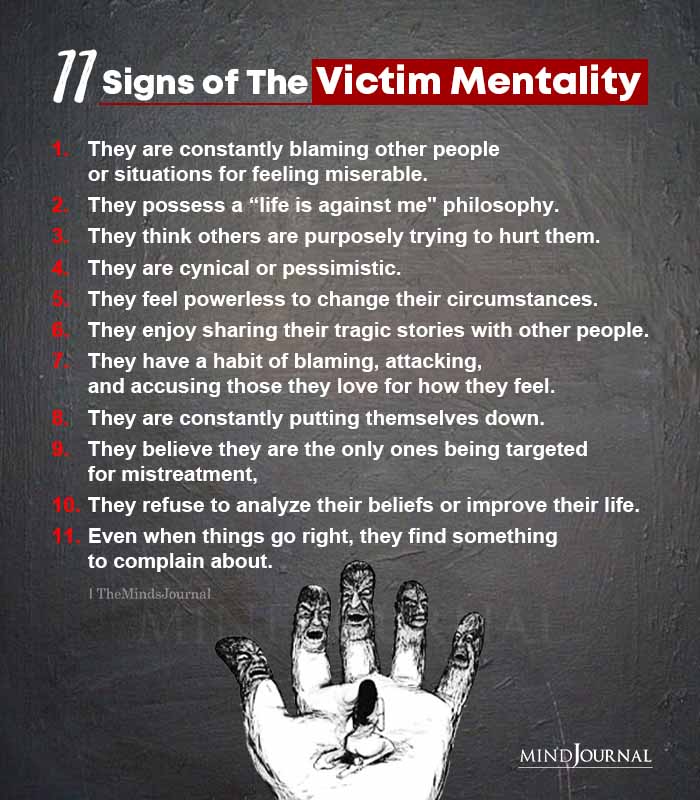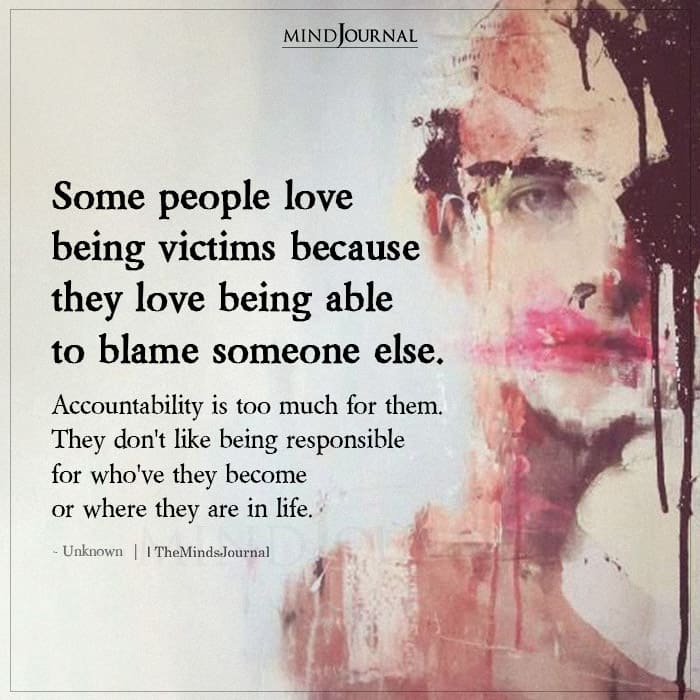Have you ever encountered anyone playing the victim, especially when their motive is to exploit others? When someone is playing the victim, rarely do they have any positive intentions, to be honest. Let’s explore what victim mentality really is and how to tell when someone is playing the victim.
KEY POINTS
- A manipulative person may play the victim to get what they want. A person who authentically opens up wants to feel understood.
- A person who plays the victim actively manipulates others by attention-seeking, inflicting guilt, and evading accountability.
- A person who is authentically opening up accepts feedback, responds to empathy, and can be vulnerable.
Listening to a loved one complain endlessly about his or her hardships can be frustrating. Even more confusing can be the loved one’s inability to integrate empathy or consider advice.
It’s as if he or she enjoys monopolizing peoples’ attention with personal tales of woe. Often, the listener can barely offer any support because a pause between the talker’s elongated complaints is rare.
Yet, a person may experience guilt for feeling annoyed and admonish herself for her insensitivity. She may compensate by allowing this person to dominate her time. Eventually, resentment may grow and the person may lose patience or attempt to get space.
Although these are understandable reactions, there may be an easy and quick way for a person to decipher whether the person is attention-seeking or actually needs support.
Three differences may help a person distinguish between a person who is engaging in a victim stance and a person who is authentically opening up.
Related: How to Spot Someone Playing The Victim? 6 Signs
3 Ways To Tell When Someone Is Playing The Victim
First, adopting a victim stance equates to a person fundamentally adhering to the belief that his or her life is more difficult than anyone else’s. The person is consumed with herself or himself and the conversation is one-sided.
He or she rejects the listener’s empathy because the real goal isn’t to feel better, it’s to control another. Alternatively, a person who authentically opens up is often concerned about burdening the listener. He or she also actively interacts, desires feedback, and accepts empathy.

Second, by acting like the vulnerable and wounded party, the person has an opportunity to inflict guilt. He or she may use hardship as a reason to exploit a person’s kindness.
For instance, let’s say Molly has an ingrown toenail. She runs into her co-worker, Lisa, at the grocery store. Lisa notices the bandage on her foot and asks Molly if she is okay. Molly groans about her condition, the pain, the inconvenience, and the stress the injury is causing.
Lisa feels for Molly and asks if there is anything she can do. Molly says, “Yes, the deadline for my project is tomorrow, but I am in so much pain. Any chance you can sketch out the proposal for me?” In this example, Molly utilizes her misfortune to take advantage of a colleague.
Conversely, a person who is sincerely struggling with a problem may disclose how she feels instead of what he or she wants from the other person. For example, Molly says to Lisa, “Yes, it is hard. I am so restless and in my head all of the time because I am sitting around. Sometimes my brain goes down a rabbit hole and I feel lost. I feel crazy sometimes.”
Lisa empathizes, “I understand. You can’t do anything but sit and think. It’s like overthinking in overdrive. It happens to me too. It’s torture. Try watching a movie that could make you laugh.”
Molly absorbs Lisa’s empathy and is very relieved she is not the only one who overthinks. She feels understood, connected to Lisa who totally gets it, and far less alone in her plight. She hugs Lisa and thanks her for listening and for the recommendation. Molly leaves the store lighter and more hopeful than before.
Related: 10 Signs Of Victim Mentality
Third, an individual who has a victim mentality often attempts to evade accountability. Using a past hardship to excuse responsibility in a current relationship is a way for the person to grant themselves a “get out of jail free card.”
For example, Mike and Laura are newly married. One day Laura notices Mike isn’t wearing his ring. She asks him about it over dinner. Mike says he was traumatized by the guys at the office when he married his first wife.
He says, “The guys at the office were brutal. They made fun of my ring and called me, ‘Triple B’ for Bed, Bath, and Beyond. They wouldn’t let up. I’m not doing that again.” Laura is confused and several weeks later discovers Mike’s profile on a dating site.

On the other hand, a person who is sincerely struggling and needs to process what he or she is feeling is usually able to be vulnerable. Vulnerability is the capacity to identify and discuss uncomfortable and distressing emotions. This individual can identify, articulate, and eventually understand what they are feeling as they work through it.
Although a kind person wishes to help everyone, it may be important to recognize who is manipulative and who is authentic.
A person who is playing the victim tends to attention-seek, inflict guilt to manipulate, and use a past hardship to escape accountability in a current relationship.
Typically, a person who is sincerely grappling with a difficulty accepts empathy and feedback, does not want anything from the listener but to feel understood, and is able to be vulnerable during the conversation.
Written By Erin Leonard Originally Appeared On Psychology Today









Leave a Reply
You must be logged in to post a comment.